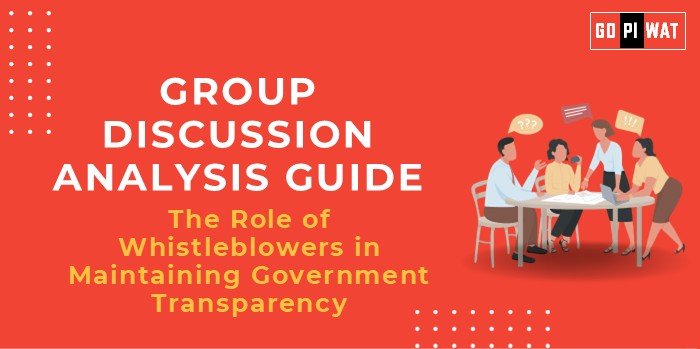📋 Group Discussion (GD) Analysis Guide
🌐 Topic: The Role of Whistleblowers in Maintaining Government Transparency
🌟 Introduction
Whistleblowers serve as the cornerstone for ensuring government transparency by exposing corruption and malpractice. Their revelations often lead to substantial reforms, but the lack of adequate protections remains a pressing concern globally and in India.
📊 Quick Facts & Key Statistics
- 🌍 Global Corruption Index 2023: Over two-thirds of countries scored below 50, highlighting widespread corruption challenges.
- 📉 Transparency International (2023): Weak justice systems exacerbate corruption, emphasizing the necessity of robust legal frameworks.
- 📜 India’s RTI Act Usage: Annually, over 2.2 million requests filed since 2005, showcasing citizen demand for transparency.
- ⚖️ Whistleblower Protections: Despite the Whistle Blowers Protection Act of 2014, its implementation is pending, leaving whistleblowers vulnerable.
🧑🤝🧑 Stakeholders and Their Roles
- 🏛️ Governments: Create and enforce robust legal frameworks to protect whistleblowers.
- 📢 Civil Society: Advocate for the rights of whistleblowers and foster public support.
- ⚖️ Judiciary: Strengthen justice systems to act on whistleblower reports effectively.
- 📰 Media: Amplify whistleblower disclosures and ensure public accountability.
- 🌟 Citizens: Demand ethical governance and stand against retaliation.
🏆 Achievements and Challenges
🎉 Achievements:
- Empowerment through India’s RTI Act, enabling transparency.
- Exposed global fraud worth billions, e.g., Panama Papers.
- Legislative progress in some countries like the EU’s whistleblower directive.
⚠️ Challenges:
- Inadequate protections: India’s 2014 Act remains unimplemented.
- Retaliation: Whistleblowers face dismissal, legal cases, and worse.
- Weak justice systems: Often fail to act decisively, as highlighted by Transparency International.
🗣️ Effective Discussion Approaches
📌 Opening Approaches:
- “Two-thirds of countries scoring below 50 in the 2023 Global Corruption Index underlines the pressing need for transparency.”
- “India’s annual filing of over 2.2 million RTI requests showcases citizens’ quest for government accountability.”
🎭 Counter-Argument Handling:
- Cite weak implementation of the 2014 Act and compare it with the EU’s protective measures.
- Present actionable solutions like technology-driven anonymous reporting systems.
🔍 Strategic Analysis of Strengths & Weaknesses
📊 SWOT Analysis:
- ✅ Strengths: Increased global awareness; public empowerment via tools like RTI.
- ❌ Weaknesses: Weak justice systems; lack of protection for whistleblowers.
- 📈 Opportunities: Leveraging AI for secure reporting; learning from global benchmarks.
- ⚠️ Threats: Misuse of whistleblower platforms; security breaches.
📖 Structured Arguments for Discussion
- ✅ Supporting Stance: “Whistleblowers are vital to democratic accountability, exposing corruption that costs billions annually.”
- ❌ Opposing Stance: “Unregulated disclosures can jeopardize national security and public trust.”
- ⚖️ Balanced Perspective: “Effective governance requires whistleblowing with safeguards to prevent misuse and ensure safety.”
🎓 Connecting with B-School Applications
- 📘 Real-World Applications:
- Discussing transparency in governance frameworks during ethics or CSR modules.
- Exploring case studies of whistleblowing in corporate and government sectors.
- 📋 Sample Questions:
- “How can governments balance whistleblower protections with national security?”
- “What are the critical challenges in implementing whistleblower frameworks?”
- 💡 Insights for Students:
- Study the interplay of transparency and governance in regulatory contexts.
- Examine successful international frameworks for protecting whistleblowers.


